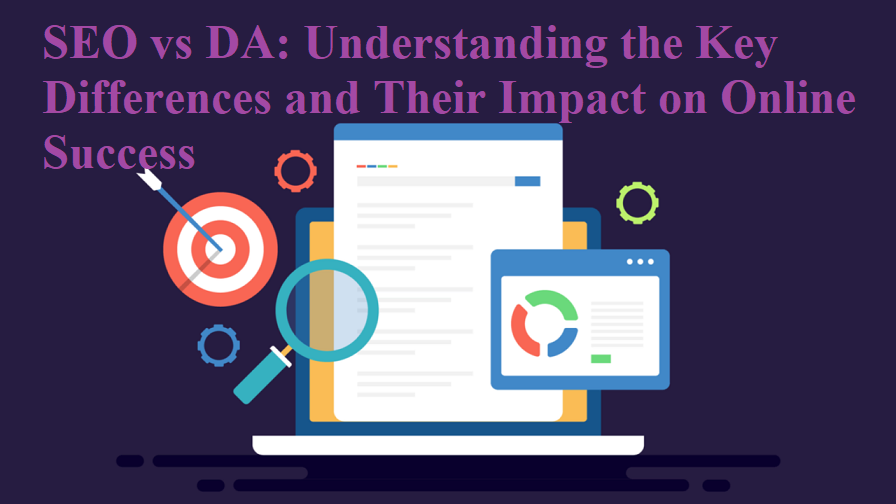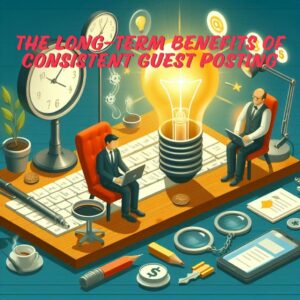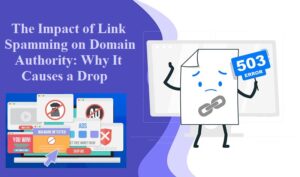In today’s digital age, having a strong online presence is essential for any business, entrepreneur, or content creator. Two of the most commonly discussed terms in the realm of digital marketing are SEO (Search Engine Optimization) and DA (Domain Authority). Both are pivotal for success in the online world, but they serve different purposes and affect your website in unique ways.
This article will dive deep into the key differences between SEO and DA, explore their individual impacts, and guide you on how to leverage both for greater online success.
What is SEO?
SEO (Search Engine Optimization) refers to the process of optimizing your website to rank higher on search engines like Google, Bing, and Yahoo. It involves various tactics aimed at improving your site’s visibility to search engine algorithms. When your site ranks higher in search engine results, more organic traffic flows in, which can lead to better engagement and sales.
SEO is generally divided into on-page and off-page strategies:
- On-page SEO focuses on elements within your website, such as keywords, meta descriptions, titles, and internal linking.
- Off-page SEO refers to efforts outside of your website, such as backlinks, social media signals, and external brand mentions.
What is DA?
DA (Domain Authority) is a metric developed by Moz, a popular SEO tool provider, to predict how well a website will rank on search engine results pages (SERPs). Unlike SEO, DA isn’t a tactic you implement but a score assigned to your website. The score ranges from 1 to 100, with higher scores indicating a greater ability to rank.
Domain Authority is based on several factors, such as:
- Backlink quality and quantity: Websites with high-quality backlinks from reputable sources tend to have higher DA.
- Site structure and user experience: Well-structured websites that offer a smooth user experience also perform better.
- Domain age and consistency: Older domains with a consistent posting and engagement history are often more authoritative.
The Key Differences Between SEO and DA
At first glance, SEO and DA may seem closely related, but they serve different functions and have distinct objectives. Here’s how they differ:
1. Purpose and Focus
- SEO: The goal of SEO is to optimize your site to improve its visibility in search engines. This includes both content-focused strategies (keywords, meta tags) and technical improvements (site speed, mobile-friendliness).
- DA: Domain Authority is a metric that reflects the overall strength of your website’s domain and how likely it is to rank well on search engines. It’s more of a predictive tool and doesn’t directly influence SEO strategies.
2. Action vs. Measurement
- SEO: It requires ongoing action—optimizing content, acquiring backlinks, improving site performance, etc. It’s an active process.
- DA: DA is a measurement or score given to your site based on various factors, many of which are indirectly related to SEO efforts. You don’t directly “do” DA; instead, it increases or decreases based on your overall SEO efforts.
3. Immediate vs. Long-term Impact
- SEO: Effective SEO can show results relatively quickly (within a few months) as search engines begin to crawl and index your optimized pages. You can adjust strategies on the go, based on traffic, rankings, and engagement data.
- DA: DA takes time to build. It’s a long-term metric that often reflects the cumulative success of your SEO, backlinking, and site trustworthiness over months or years.
4. Focus on Individual Pages vs. Entire Site
- SEO: With SEO, you can focus on optimizing individual pages or blog posts, targeting specific keywords, and addressing content gaps.
- DA: DA is concerned with the overall health and authority of your entire domain. Even if one page ranks well, it doesn’t necessarily improve your DA.
5. Visibility and Ranking Factors
- SEO: Optimizing your site for search engines involves considering hundreds of ranking factors, such as keyword relevance, page speed, mobile-friendliness, and meta tags.
- DA: DA is largely determined by factors like the number and quality of inbound links, domain age, and the reputation of your site in the eyes of search engines.
How SEO and DA Work Together
Now that we’ve covered the differences, it’s important to understand how SEO and DA are interconnected. Think of SEO as the groundwork for improving your website’s ranking, while DA is the long-term gauge of how well you’re doing in the competitive online space.
- Backlinks as the Bridge
One of the key factors that impacts both SEO and DA is backlinks. High-quality backlinks not only improve your DA but also boost your SEO rankings by signaling to search engines that your site is trustworthy and authoritative. - User Experience and Technical SEO
A well-optimized website with excellent site speed, clean navigation, and mobile responsiveness will naturally perform better in SEO rankings. Over time, as these factors improve, your DA is also likely to increase. - Content Optimization
High-quality content is essential for SEO and influences DA indirectly. Regularly publishing well-researched, keyword-optimized, and engaging content improves your chances of ranking higher on search engines. As more people link to your valuable content, your DA score benefits.
Which is More Important for Online Success?
If you’re asking whether SEO or DA is more important, the answer depends on your goals:
- Short-term success: If you want quick wins, such as ranking for specific keywords or driving immediate traffic to your site, SEO should be your primary focus.
- Long-term success: If you’re building a long-lasting online presence and want to establish yourself as an authority in your niche, improving your DA should be part of your strategy.
In reality, both are crucial for sustained online success. SEO drives traffic in the short term, and DA reflects your long-term credibility. A balanced approach—focusing on SEO strategies while simultaneously building up your DA—will provide the best results.
How to Improve Both SEO and DA
1. Focus on High-Quality Content
Google rewards websites that provide value. Whether you’re optimizing for SEO or improving your DA, you need high-quality, original content that answers user questions and meets search intent.
2. Build a Strong Backlink Profile
Aim for backlinks from high-authority websites. A strong backlink profile will not only boost your SEO efforts but also improve your DA score. However, avoid spammy or low-quality backlinks, as these can harm your domain authority.
3. Optimize Your On-Page SEO
Ensure that your meta tags, headers, keywords, and internal linking structure are optimized. On-page SEO improvements are essential for both better rankings and improving your site’s overall authority.
4. Improve Technical SEO
Make sure your site loads quickly, is mobile-friendly, and has a clean site architecture. Technical SEO not only improves rankings but also enhances user experience, which search engines value highly.
5. Be Patient and Consistent
Building SEO and DA takes time. Consistency in producing quality content, improving site structure, and acquiring backlinks will lead to steady improvements in both areas over time.
Conclusion
Both SEO and DA play critical roles in your website’s online success, but they function differently. SEO focuses on short-term, actionable strategies to improve search engine rankings, while DA is a long-term metric reflecting your site’s overall authority.
To achieve sustainable online success, you need to focus on both: execute a solid SEO strategy while building up your DA through quality backlinks and a trustworthy online presence. Balancing these two pillars will help you rise above the competition and achieve greater visibility, credibility, and success in the digital world.














+ There are no comments
Add yours